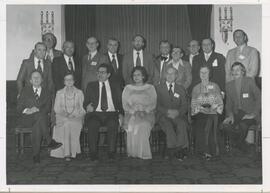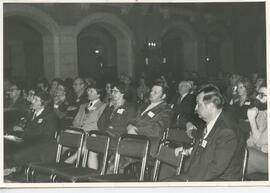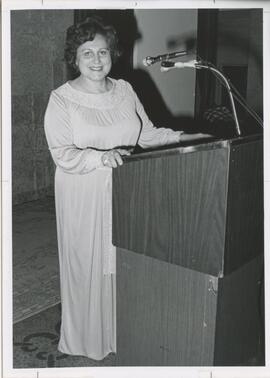This item contains an interview recorded with George Webber and Mrs. Henny Webber on October 15, 1976 in Stoney Plain, AB. George came to Canada in 1898 to Stoney Plain. Came over with his parents by boat (boarded in Riga). His family was German, lived in Saratov on Volga River. 40 miles west of Saratov, place [Norka] – all German settlers. The family decided to come to Canada. Catherine II brought Germans to Russia and gave them 100 years of relief from military service. In 1882/3 Russian-Turkish was broke out and his dad had to go to that war, but he did not want to. A relative was at Duma, came to [Norka] and advised them to leave. The family then went to Lincoln, Nebraska. His father and 2 uncles worked together, had mills and farmed at the same time. They did not like it in the USA. So they came to Canada in 1898, when land was $3 an acre. His wife came after him, in 1910, with one of his cousins. He knew his wife’s mother but not Henny. Problems with settling in Stony Plain: clearing land, WWI broke out. People were nice to them and helpful.
Henny was born in [Norka], Russia. Came to Canada in 1925 with her husband. Came to Stony Plain because had friends over there. Did not speak English when arrived. Early life in Canada was difficult. Had sisters in the Old Country, in the Siberia. Some relatives went back to Russia in few years. Speaking German in Russia, attending a Russian school – she understood Russian. She had 7 children; they spoke German at home.
Life in Stony Plain during WWII was not easy – Germans were suspects.
This item contains an interview with Mr. Eichele and Mr. Louis Oel, conducted in Calgary, AB in German on August 25, 1982. Content of the interview contains discussion on their school years – walking about 3 km to the school. The important role of the priest and church – every morning had to go first to the church. On weekends, visited the church twice or even thrice, The Albert Cattle Association, paying big taxes while being unemployed, and taking over an agency in Calgary
Eichele, Mr.This item contains two interviews, one conducted with Mr. and Mrs. German, and another with Mr. Eichele. M. German was born in 1909 in Odesa, although originally the family came from Germany and spoke German. His parents were farmers. They came on a steam boat from Liverpool to Halifax, they then came to Regina on a train from Halifax where he had an uncle, and moved to Alberta in the Spring of 1910, to Bow Island, an area with many Germans. His dad built a house, which was more like a shack, where they had some animals. His dad grew wheat. He took over his dad’s farm. During WWI, when they already lived in Canada, his family did not have problems because they were Germans, although they did experience tough times during the Depression. Mr. and Mrs. German got married in 1924, then bought the land. In 1940, they came to Calgary. Then sold it and bought the lot and built the place they were being interviewed. Retired in 1968. Have 2 children. Mrs. German's parents came from Russia, too ([Menheim] near Odesa). She was born in the USA, in Mackintosh, North Dakota in 1907. Her parents had a homestead over there. Then they moved into Alberta in about 1908. Her father got a homestead in Alberta. They moved together with a big German community. She had 6 siblings and was the youngest, 2 from the previous marriage of her dad. Her family was Catholic and spoke German.
German, John LennardThis item contains an interview with Pastor Dusterhoff. Pastor was born on December 11, 1897, in a colony [Niedernstine] in the Novohrad-Volynsk district. Both parents were born there too. His great-grandfather settled there around 1855-1860 coming from Poland, from Radom. They were from Posen in Eastern Prussia originally. Polish nobility rented/sold them the land. His great-grandfather had 40 desiatyn of good land. They had mixed farming. He has been a pastor for 52 years in Western Canada, 51 of them in Alberta. He discusses how he came to Canada and how he became a pastor, as well as the German Moravian congregation in the Leduc area.
Pastor DusterhoffThis item contains a recording of Avenir Nizoff and George Ivanenko talking about the Harbin immigrants. They discuss different groups of people coming from Harbin starting in 1924. They discuss religion, wars, politics, language, and ethnicity, in relation to these people.
Nizoff, Avenir

